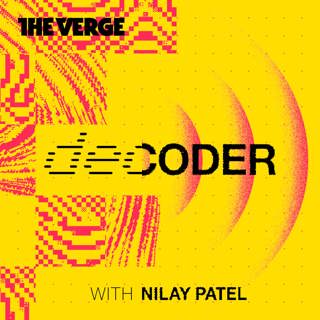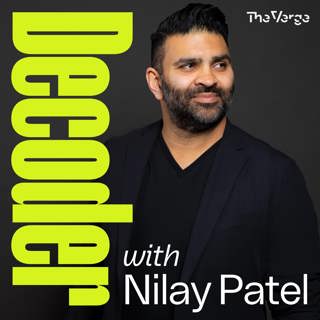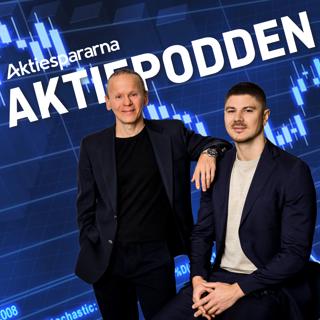
Pat Gelsinger came back to turn Intel around – here’s how it’s going
Today I'm talking to Pat Gelsinger, the CEO of Intel. I’ve been excited to have this conversation for a very long time – ever since Pat took over as CEO a little over a year and a half ago. After all. Intel is a very important company with a huge series of challenges in front of it. It’s still the largest chip manufacturer by revenue, and makes more chips than any other company in the United States. In fact there are basically only three major chip manufacturers: Taiwan Semiconductor Manufacturing Company, or TSMC, which is in Taiwan, Samsung, based in South Korea. And Intel, here in the United States. The Intel Pat took over was struggling, and was losing ground to in a variety of markets. But in the past year and a half, Pat’s restructured the company, turned over almost all of its leadership positions, opened a new line of business that would compete with TSMC and make chips for other companies including Intel’s competitors, and generally tried to reset Intel’s famous engineering culture around engineering. Glossary: IFS - Intel Foundry Service. Raptor Lake - codename for intel's Gen 13 processors that were just the day before we had our conversation. Sapphire Rapids - the codename for Intel's 4th generation Xeon server processors. 20A and 18A - 20A is a rebranding of what was intel's 5nm process scheduled to debut in 2024 and 18A is a rebranding of Intels 5nm+ node due out in 2025. Packaging - integrated circuit packaging is the last step of semiconductor fabrication. It's where a block of semiconductor material is put into a case. The case, is known as a "package" and that is what allows you put a circuit on a board. Wafers - When a processor is made they make processors you make hundreds of them at once on a giant wafer. EUV - is Extreme Ultraviolet Lithography. It's the most advanced way to make chips. ASML - Is the company that makes the machines that lets you make chips. They are the only company that makes EUV machines. RibbonFET - A new transistor technology that Intel developed. ISV - Independent Software Vendors. PDK - Process Design Kit is a set of files that have data and algorithms that explain the manufacturing parameters for a given silicon process. EDA tools - stands for Electronic Design Automation tools. Basically software tools that are used to design and validate the semiconductor manufacturing process. Robert Noyce and Gordon Moore - the founders of Intel. Andy Grove - employee #3 who went on to become one of their most successful CEOs. Links: Moore's Law Intel is replacing its CEO in February Intel has to be better than ‘lifestyle company’ Apple at making CPUs, says new CEO Apple is switching Macs to its own processors starting later this year Apple MacBook Air with M1 review: new chip, no problem What we know about Intel’s $20 billion bet on Ohio Intel is building a new €17 billion semiconductor manufacturing hub in Germany Intel delays ceremony for Ohio factory over lack of government funding Intel needs 7,000 workers to build its $20 billion chip plant in Ohio Biden signs $280 billion CHIPS and Science Act President Joe Biden speaks after groundbreaking for Intel’s $20 billion semiconductor plant Intel’s top Arc A770 GPU is priced at $329, available October 12th Intel’s 13th Gen processors arrive October 20th with $589 flagship Core i9-13900K Transcript: https://www.theverge.com/e/23149693 Credits: Decoder is a production of The Verge, and part of the Vox Media Podcast Network. Today’s episode was produced by Creighton DeSimone and Jackie McDermott and it was edited by Callie Wright. The Decoder music is by Breakmaster Cylinder. Our Sr Audio Director is Andrew Marino and our Executive Producer is Eleanor Donovan. Learn more about your ad choices. Visit podcastchoices.com/adchoices
4 Okt 20221h 8min

How Arm conquered the chip market without making a single chip, with CEO Rene Haas
One of the more interesting quirks of the modern tech world is that there’s a really important company at the center of it all that doesn’t make anything. But its work is in your phone, in your TV, your car and maybe even your laptop. I’m talking about ARM, a chip design company that’s been through quite a lot these past few years, and I'm talking to Arm CEO Rene Haas. Arm designs the instruction sets for modern chips: Qualcomm’s chips are Arm chips. Apple’s chips are Arm chips. Samsung’s chips are Arm chips. It’s the heart of modern computing. Arm licenses the instruction set to those companies, who then go off and actually make chips with all sorts of customizations. Basically every smartphone runs an Arm processor, Apple’s Macs now run arm processors, and everything from cars to coffee machines are showing up with more and more arm processors in them. We want to know what you think about Decoder. Take our listener survey! Transcript: https://www.theverge.com/e/23137412 Links: The Vergecast: The HDMI Holiday Spec-tacular on Apple Podcasts Biden signs $280 billion CHIPS and Science Act Intel needs 7,000 workers to build its $20 billion chip plant in Ohio - The Verge What comes after the smartphone, with Qualcomm CEO Cristiano Amon - The Verge Why the global chip shortage is making it so hard to buy a PS5 Nvidia’s huge Arm deal has just been scrapped What is a SoC? What is an ECU? Credits: Decoder is a production of The Verge, and part of the Vox Media Podcast Network. Today’s episode was produced by Creighton DeSimone and Jackie McDermott and it was edited by Callie Wright. The Decoder music is by Breakmaster Cylinder. Our Sr Audio Director is Andrew Marino. Our Editorial Director is Brooke Minters. And our Executive Producer is Eleanor Donovan. Learn more about your ad choices. Visit podcastchoices.com/adchoices
27 Sep 20221h 2min

Can software simplify the supply chain? Ryan Petersen thinks so
Ryan Petersen, is the CEO of Flexport, ac ompany that builds software that integrates all the different shipping vendor systems you might run into as you try to get a product from a factory in China to a consumer in Idaho: rail, sea, truck. We’ve talked about the supply chain and inventory management on Decoder with a lot of our guests — the chip shortage seems to affect every company, and sorting out how to get products made and delivered on time is a pretty universal problem. But we haven’t really talked about how products get from one place to another around the world. So I wanted to talk to Ryan, figure out what Flexport’s role in all this is, what his bigger supply chain solutions would be, and why he’s leaving his job as CEO to be executive chairman and handing the reins to Dave Clark, who used to work at Amazon. Links: Dave Clark to Join Flexport As Our New CEO Flexport Wants to Be Uber of the Oceans At Google, Eric Schmidt Wrote the Book on Adult Supervision The real story behind a tech founder’s ‘tweetstorm that saves Christmas’ Ryan's twitter thread Transcript: https://www.theverge.com/e/23126062 Credits: Decoder is a production of The Verge, and part of the Vox Media Podcast Network. Today’s episode was produced by Creighton DeSimone and Jackie McDermott and it was edited by Callie Wright. The Decoder music is by Breakmaster Cylinder. Our Sr Audio Director is Andrew Marino. Our Editorial Director is Brooke Minters. And our Executive Producer is Eleanor Donovan. Learn more about your ad choices. Visit podcastchoices.com/adchoices
20 Sep 20221h 2min

Everyone knows what YouTube is. Few know how it really works.
Today, I’m talking to Mark Bergen, a reporter at Bloomberg and the author of a new book about YouTube called. Like, Comment, Subscribe: Inside YouTube’s Chaotic Rise to World Domination. YouTube has always been fascinating to me because it’s such a black box: everyone feels like they know how the platform works, but very few people have a real understanding of the internal politics and tradeoffs that actually drive YouTube’s decision. Mark’s book is one of the best of its kind I’ve read: not only does he take you inside the company, but he connects the decisions made inside YouTube to the creators who use the platform and the effects it has on them. This was a fun one – keep in mind that for as little as we might know about YouTube, we might know even less about TikTok, which is driving all sorts of platforms, even YouTube, into competing with it. Transcript: https://www.theverge.com/e/23113078 Links: YouTube Partner Program Hank Green on Decoder iJustine Credits: Decoder is a production of The Verge, and part of the Vox Media Podcast Network. Today’s episode was produced by Creighton DeSimone and Jackie McDermott and it was edited by Callie Wright. The Decoder music is by Breakmaster Cylinder. Our Sr Audio Director is Andrew Marino. Our Editorial Director is Brooke Minters. And our Executive Producer is Eleanor Donovan. Learn more about your ad choices. Visit podcastchoices.com/adchoices
13 Sep 20221h 4min

Rewind: How big companies kill ideas — and how to fight back, with Tony Fadell
This episode was originally published on May 3rd, 2022. Tony Fadell was instrumental in the development of the iPod and iPhone at Apple and then co-founded Nest Labs, which kicked off the consumer smart home market with its smart thermostat in 2011. Tony sold Nest to Google for $3.2 billion in 2014 and eventually left Google. He now runs an investment company called Future Shape. Links: Inside the Nest: iPod creator Tony Fadell wants to reinvent the thermostat General Magic - Trailer Inside Facebook’s metaverse for work Silicon Graphics Google is reorganizing and Sundar Pichai will become new CEO Fire drill: can Tony Fadell and Nest build a better smoke detector? Google purchases Nest for $3.2 billion Twitter accepts buyout, giving Elon Musk total control of the company Nest is rejoining Google to better compete with Amazon and Apple Apple Music Event 2005 - Motorola Rokr E1 / iTunes Phone Activision Blizzard hit with another sexual harassment lawsuit Nest buying video-monitoring startup Dropcam for $555 million What matters about Matter, the new smart home standard ZIGBEE ON MARS! Directory: Steve Jobs, CEO of Apple Andy Grove, former CEO of Intel Pat Gelsinger, current CEO of Intel Sundar Pichai, current CEO of Alphabet Elon Musk, CEO of Tesla, SpaceX, and The Boring Company Jeff Williams, COO of Apple Matt Rogers, Nest co-founder Jeff Robbin, VP of consumer applications at Apple Steve Hoteling, former CEO gesture recognition company Finger Works Jon Rubinstein, senior VP of the iPod division at Apple Steve Sakomen, hardware engineer and executive at Apple Avie Tavanian, chief software technology officer at Apple Scott Forstall, senior VP of iOS software, Apple Jony Ive, chief design officer, Apple Transcript: https://www.theverge.com/e/22817673 Credits: Decoder is a production of The Verge, and part of the Vox Media Podcast Network. Today’s episode was produced by Creighton DeSimone and Jackie McDermott and it was edited by Callie Wright. The Decoder music is by Breakmaster Cylinder. Our Sr Audio Director is Andrew Marino and our Executive Producer is Eleanor Donovan. Learn more about your ad choices. Visit podcastchoices.com/adchoices
6 Sep 20221h 16min

How the head of Facebook plans to compete with TikTok and win back Gen Z
We’ve got a special episode of Decoder today – an interview between Verge deputy editor Alex Heath and Meta’s Tom Alison, the head of Facebook. Alex is the co-host of the newest season of Vox Media’s podcast Land of the Giants. This season is about Facebook and Meta. The season finale comes out tomorrow. Alex has been reporting for Land of the Giants for many months, and along the way he interviewed Tom. Facebook has a lot of challenges, but it seems like the biggest problem is TikTok: Facebook's problem is that it spent years – you spent years – building out a social graph that, it turns out, is less interesting than just being shown content that the company thinks you might like. Alison has been at Facebook for more than a decade and previously ran engineering for the News Feed, so he knows more than almost anyone about the history of feeds and where they are going. Links: Land of the Giants Facebook is changing its algorithm to take on TikTok, leaked memo reveals Facebook is revamping its home feed to feel more like TikTok Transcript: https://www.theverge.com/e/23092319 Credits: Decoder is a production of The Verge, and part of the Vox Media Podcast Network. Today’s episode was produced by Creighton DeSimone and Jackie McDermott and it was edited by Callie Wright. The Decoder music is by Breakmaster Cylinder. Our Sr Audio Director is Andrew Marino. Our Editorial Director is Brooke Minters. And our Executive Producer is Eleanor Donovan. Learn more about your ad choices. Visit podcastchoices.com/adchoices
30 Aug 20221h 3min

Advertising is everywhere. Wieden+Kennedy CEO Neal Arthur explains how it works
One thing that strikes me, in all these episodes of Decoder, is how little any of us really pay attention to the advertising industry, and how deeply connected it is to almost other every modern business. After all you can start a company and invent a great product, but you still need to market it: you need to tell people about it, and eventually convince them to buy it. And so you take out an add on a platform and, well, the platform companies we all depend on mostly run on ads. Google’s entire consumer business is ads. Meta’s entire business is ads. And when we talk to creators, they’re even more tied to ads: their distribution platforms like TikTok and YouTube are all ad-supported, and a huge portion of their revenue is ads. This week I’m talking to Neal Arthur, the CEO of Weiden and Kennedy, one of the few independent major ad agencies in the world, and maybe the coolest one? It’s got a rep. Weiden is the agency that came up with Just Do It for Nike and Bud Light Legends for Bud Light. They’ve done campaigns for Coke, Miller, Microsoft, ESPN – you name it. Coming off our conversation last week with Katie Welch about building a brand from the ground up using influencer marketing and potentially never hiring an ad agency, I wanted to get a view from the other side: how does a big ad agency work? Where does their money come from? So many of the big agencies are merging into what are called holding companies – why is Wieden still independent? Links: Bud Light puts creative account up for review after years with Wieden+Kennedy Mover Over Millennials -- Here Comes Gen Z How Selena Gomez's Rare Beauty Goes Viral, With CMO Katie Welch Mad Men (TV Series 2007-2015) Transcript: https://www.theverge.com/e/23081723 Credits: Decoder is a production of The Verge, and part of the Vox Media Podcast Network. Today’s episode was produced by Creighton DeSimone and Jackie McDermott. It was edited by Callie Wright. And researched by Liz Lian. The Decoder music is by Breakmaster Cylinder. Our Sr Audio Director is Andrew Marino. Our Editorial Director is Brooke Minters. And our Executive Producer is Eleanor Donovan. Learn more about your ad choices. Visit podcastchoices.com/adchoices
23 Aug 20221h 1min

How Selena Gomez's Rare Beauty goes viral, with CMO Katie Welch
Katie Welch is the Chief Marketing Officer of Rare Beauty — the beauty products company founded by superstar musician and actress Selena Gomez. Rare Beauty sells its products online and in Sephora retail stores, and importantly, Katie does almost no traditional marketing: Rare Beauty is a true internet brand, that depends on social media strategy, influencer marketing, and community to drive sales. Specifically, the enormous community around Selena Gomez, who, again, is an international superstar with a fandom of her own. This kind of marketing is essentially new. Famous people making their own products and companies and using their online reach to launch and grow those businesses is a combination of art and commerce that is 10 – 15 years old at most, Rihanna’s Fenty Beauty is only five years old, but it’s redefined the industry and helped make her a billionaire. Some of the first big successes came from the Kardashian-Jenners including Kylie Cosmetics, founded in 2015, as well as Kim Kardashian’s Skims, founded in 2019. I’ve been really curious about how these businesses work, how they reach their audiences and customers, how CMOs like Katie measure success, whether being the marketing executive for an super online celebrity-driven business feels different than being a traditional marketing person, and whether the ever-present risk of weird things happening online make her plan differently. Transcript: https://www.theverge.com/e/23071490 Links: Why BeReal is breaking out Why Hank Green can’t quit YouTube for TikTok Apple’s app tracking transparency feature isn’t an instant privacy button Apple’s app tracking policy reportedly cost social media platforms nearly $10 billion Updating The Verge’s background policy Marketing Funnels Katie's TikTok Instagram walks back TikTok-style changes — Adam Mosseri explains why Makeup company Glossier to sell its products at Sephora as new CEO pushes to expand reach Credits: Decoder is a production of The Verge, and part of the Vox Media Podcast Network. Today’s episode was produced by Creighton DeSimone and Jackie McDermott and it was edited by Callie Wright. The Decoder music is by Breakmaster Cylinder. Our Sr Audio Director is Andrew Marino. Our Editorial Director is Brooke Minters. And our Executive Producer is Eleanor Donovan. Learn more about your ad choices. Visit podcastchoices.com/adchoices
16 Aug 20221h 1min






















